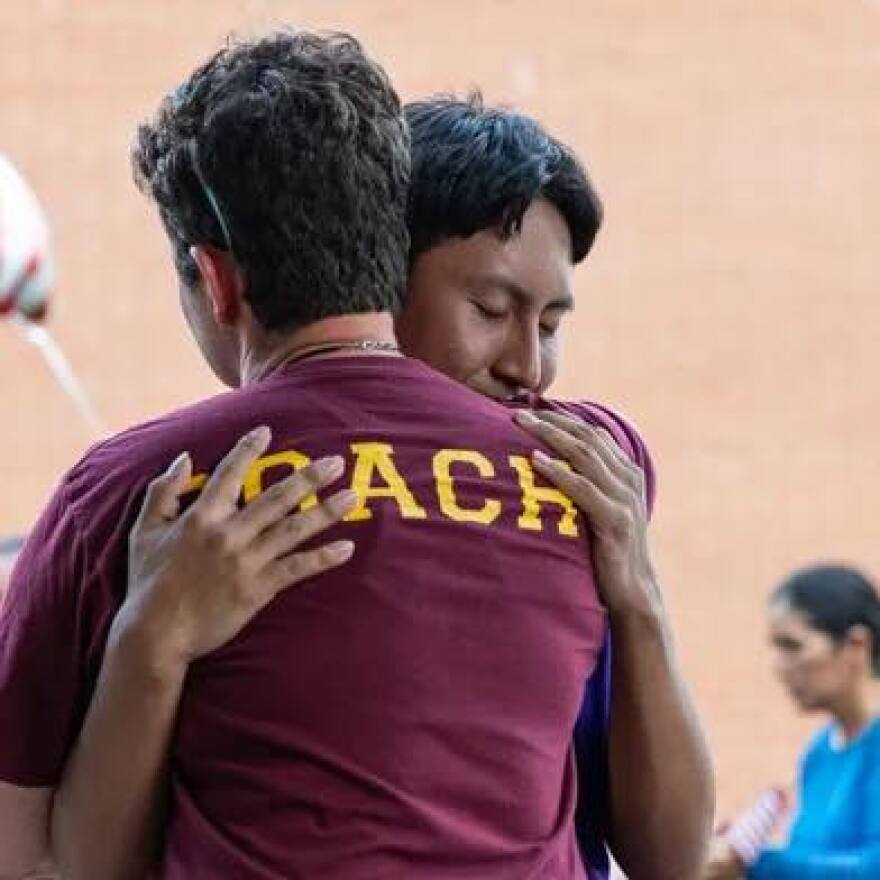As students file back into classrooms, some immigrant families are faced with an unexpected back-to-school reality: Immigration and Customs Enforcement agents detaining children and parents at the door.
The Trump administration says its immigration crackdown only targets illegal violent criminal offenders, but advocates say thousands of immigrant children have been caught in the crossfire and have been detained by masked ICE agents only to be taken to remote facilities far from home.
Luma Mufleh is the founder and CEO of Fugees Family, a Bowling Green-based nonprofit serving refugee communities in Kentucky, Ohio and Georgia. She said the official number of children unlawfully detained by ICE is a blurry figure, largely because when those children are taken, the proper documentation isn’t always filled out. She saw that play out in real time when Bowling Green teenager Ernesto Manuel-Andres was detained in June.
“For 12 hours we didn’t know where he was. Then, all of the sudden, he was in Monroe, Louisiana. That’s scary, because they’re supposed to log them into the ICE locator. I’m not his parent and I was panicked, I’m like, ‘We’ve lost him, where is he?’ All day on a Saturday I had like six people working trying to locate him, calling every possible detention center in Ohio, Kentucky and Tennessee, we thought he’d be at least in the area,” Mufleh said.
Manuel-Andres, 18, was in the Louisiana detention center for three weeks before being released on bond. He was born in Guatemala, but is in the United States under a special protective order for young people that enter the U.S. after suffering abuse, neglect or abandonment.
Mufleh said that while Manuel-Andres was detained, he was housed in subpar conditions alongside some of the nation’s most violent offenders.
“The stories we’re hearing from these facilities is that they’re overcrowded, they’re not providing three meals a day – where’s the federal oversight on what’s happening in the detention centers?” Mufleh asked.
She said that the education and advocacy from Fugees Family made a key difference in Manuel-Andres’ ability to stay in the U.S.
“He was asked three times to sign self-deportation papers, and he knew to say ‘No, speak to my lawyer’, but how many people would just sign any piece of paper that someone with authority or in a uniform tells them to sign?”
Mufleh added that while Manuel-Andres’ journey has been a difficult one, he has the advantage of a community that will support him as the legal battle with ICE continues. However, she said many who are unlawfully detained and deported lack that advantage and are being unjustly targeted in broad immigration sweeps.
“The mandate was to deport the violent criminals, right? I don’t think there’s anyone that would disagree with that, the murderers, rapists, drug traffickers. But the people that are being targeted and held are not that. Targeting kids is not okay,” Mufleh said.
Even in cases where it’s found that somebody was unlawfully detained, legal and transportation fees quickly add up for vulnerable families. Mufleh detailed the cost of hiring legal representation, interpreters, transportation to and from Louisiana, food, and added staffing on nights and weekends for the nonprofit.
While Fugees Family was able to cover those expenses in Manuel-Andres’ case, he’s not the only one to be targeted. The nonprofit has now organized the Fugees Freedom Fund to help cover the expenses of children who have been unlawfully detained by ICE, and are now caught in the legal battle to be released.
“I believe in treating my students like they’re my own kids. If my kids were put into detention, I’d make sure they have a good lawyer to represent and fight for them and to pursue legal options for them. I think when you’re not from this country and you’re not familiar with our legal system, it’s really hard to navigate. Immigration is so hard to navigate, even if you’re born here,” Mufleh said.
The nonprofit has set a $100,000 goal with the expectation that more representation will be needed in the near future for children detained by ICE.




